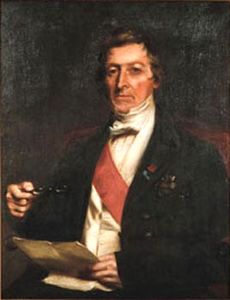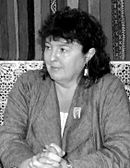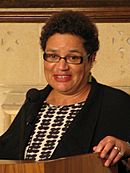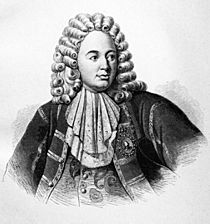Scottish people facts for kids
|
|
||||||||||||||||||||||||||||||||
| Total population | ||||||||||||||||||||||||||||||||
|---|---|---|---|---|---|---|---|---|---|---|---|---|---|---|---|---|---|---|---|---|---|---|---|---|---|---|---|---|---|---|---|---|
| c. 28–40 million worldwideA | ||||||||||||||||||||||||||||||||
| Regions with significant populations | ||||||||||||||||||||||||||||||||
| 6,006,955 Scottish 5,393,554 Scotch-Irish |
||||||||||||||||||||||||||||||||
| 4,719,850 | ||||||||||||||||||||||||||||||||
| 1,792,600 | ||||||||||||||||||||||||||||||||
| 795,000 | ||||||||||||||||||||||||||||||||
| 760,620 | ||||||||||||||||||||||||||||||||
| 100,000 | ||||||||||||||||||||||||||||||||
| 80,000 | ||||||||||||||||||||||||||||||||
| 45,000 | ||||||||||||||||||||||||||||||||
| 15,000 | ||||||||||||||||||||||||||||||||
| 12,792 | ||||||||||||||||||||||||||||||||
| 2,403 | ||||||||||||||||||||||||||||||||
| 1,459 | ||||||||||||||||||||||||||||||||
| Languages | ||||||||||||||||||||||||||||||||
| English (Scottish English) Scottish Gaelic • Scots |
||||||||||||||||||||||||||||||||
| Religion | ||||||||||||||||||||||||||||||||
| Presbyterianism, Roman Catholicism, Episcopalianism; other minority groups; agnostics, deists and atheists. | ||||||||||||||||||||||||||||||||
|
A These figures are estimates based on official census data of populations and official surveys of identity. B Scottish Americans and Scotch-Irish Americans. C Scottish Canadians. D Scottish born people in England only E Ulster-Scots F missing G Number of people born in Scotland. |
||||||||||||||||||||||||||||||||
Scottish people are an ethnic group and nation from Scotland. They are also called Scots. Historically, they formed from a mix of different groups. These included the Picts and Gaels, who started the Kingdom of Scotland in the 800s. Later, other groups like the Cumbrians, Anglo-Saxons, and Norse joined them.
Today, "Scottish people" or "Scots" means anyone who has family, cultural, or language roots in Scotland. The old Latin word Scoti first meant the Gaels. But it later came to describe everyone living in Scotland. The term "Scotch" is sometimes used, but it's not preferred for people.
Many people with Scottish roots live all over the world. This happened because many Scots moved away over time. Reasons included the Highland Clearances, Scotland's role in the British Empire, and later, job losses from factories closing. Scottish people took their languages and culture with them. Large groups settled in North and South America, Australia, and New Zealand. Canada has the most Scottish descendants per person. The United States has the largest total number.
Scotland has also seen many different groups settle there over time. Germanic peoples, like the Anglo-Saxons, arrived in the 600s. The Norse settled parts of Scotland from the 700s onwards. In the Middle Ages, people from France, England, and the Low Countries also moved to Scotland. Some famous Scottish family names, like Bruce and Stewart, came from this time. Today, Scotland is part of the United Kingdom. Most people living there are British citizens.
Contents
Who Are the Scottish People?
In early times, Scotland had several main groups. These were the Picts, the Gaels, the Britons, and the Angles. Most people in Scotland spoke Celtic languages until the 1200s. These included the languages of the Britons, Gaels, and Picts.
The Angles were a Germanic group. They settled in southeast Scotland. Their language, Old English, later became what we know as Scots. The Gaelic language spread across most of Scotland by the 800s. It was most common between the 1000s and 1200s. But it was never the main language in the southeast.
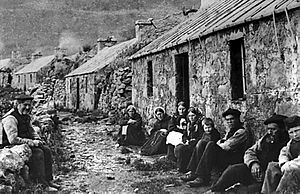
Around the 1100s, King David I invited Anglo-Norman families to settle in Scotland. They came from France and England. This brought a new style of feudalism to Scotland. Many common Scottish family names, like the Stewarts and the Bruces, come from these Norman settlers.
The Northern Isles and parts of Caithness spoke Norn. This was a Norse language. From 1200 to 1500, the Early Scots language spread across the lowlands. This is the area between Galloway and the Highland line.
From the 1500s, Scotland was often divided by language. There were Gaelic-speaking "Highlanders" and Inglis-speaking "Lowlanders." Today, many other languages are spoken due to immigration. However, almost everyone in Scotland speaks English fluently.
Scots Around the World
Today, Scotland has over five million people. Most of them consider themselves Scottish. But many more people with Scottish roots live outside Scotland.
| Numbers of the Scottish diaspora | |||||
|---|---|---|---|---|---|
| Census Year | Population | % of the local population |
|||
| 1,792,622 | 8.3 |
|
|||
| 708,872 | 1.34 |
|
|||
| 5,460,679 | 1.5 |
|
|||
| 3,257,161 | 1.1 |
|
|||
| 4,714,965 | 14.35 |
|
|||
Scottish People in the United States
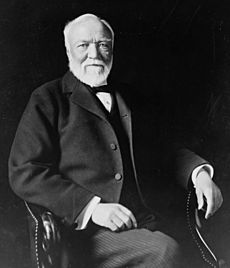
In 2013, over 5.3 million people in the US said they were Scottish. Another 2.9 million said they were of Scotch-Irish descent. The number of Americans with Scottish ancestors is very large. It is estimated to be between 9 and 25 million people.
Many Scotch-Irish people first came from Lowland Scotland. They moved to Ulster in Ireland. Then, in the 1700s, many moved to North America.
Scottish People in Canada
Scottish people are the third-largest ethnic group in Canada. They were among the first Europeans to settle there. They have greatly influenced Canadian culture. In 2011, over 4.7 million Canadians said they had Scottish roots. This is about 15% of Canada's population.
Scottish culture is especially strong in Nova Scotia. This name means "New Scotland" in Latin. In Cape Breton, both lowland and highland Scots settled. A small number of people there still speak Canadian Gaelic. Cape Breton is home to the Gaelic College of Celtic Arts and Crafts.
Scottish People in Australia
By 1830, Scots made up over 15% of Australia's non-Aboriginal population. This number grew to 20-25% by the mid-1800s. The Australian gold rush in the 1850s brought even more Scots. About 90,000 Scots moved to Australia during this time. Many came after the Highland Potato Famine and the Highland Clearances.
Scottish immigration continued into the 1900s. Many Scots arrived after 1945. Today, you can see a strong Scottish culture in Australia. This includes Highland Games, dance, and Tartan Day celebrations. In 2011, over 1.7 million Australians claimed Scottish ancestry. This is about 8.9% of the total population.
Scottish People in New Zealand
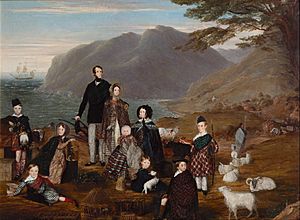
Many Scottish people also settled in New Zealand. About 20% of the first European settlers in New Zealand were from Scotland. Scottish influence is still clear across the country. The city of Dunedin in the South Island is famous for its Scottish heritage. It was named after Edinburgh by its Scottish founders.
Most Scottish immigrants settled in the South Island. They formed Caledonian societies. These groups helped keep Scottish culture alive. From the 1860s, they held annual Caledonian Games. These sports events brought Scottish settlers and other New Zealanders together. In 2013, about 25,953 people living in New Zealand were born in Scotland.
Scottish People in the United Kingdom
Many people with Scottish roots live in other parts of the United Kingdom. In Ulster, a region in Ireland, many Scottish Presbyterians settled. This was due to the policies of King James VI. This group formed the Ulster-Scots community.
It is hard to know the exact number of Scottish descendants in England and Wales. This is because of many migrations over history. In 2011, 708,872 people born in Scotland lived in England. Another 24,346 lived in Wales. And 15,455 lived in Northern Ireland. The town of Corby in Northamptonshire became a center for Scottish migration in the 1930s. In 2011, 12.7% of its residents were born in Scotland.
Scots in Europe and Beyond
Scots have moved to mainland Europe for centuries. They went as merchants and soldiers. Many settled in France, Poland, Italy, Germany, Scandinavia, and the Netherlands. Some experts think up to 250,000 Russian people might have Scottish ancestors.
In the Netherlands, Scottish traders settled in places like Veere and Rotterdam. They were allowed to trade freely. The 'Scots House' in Veere was the only place outside Scotland where Scots Law was practiced. The Scots International Church in Rotterdam has been open since 1643.
In Russia, Scottish soldiers were mentioned as early as the 1300s. Many Scots became famous and wealthy during the time of Peter the Great. These included generals and architects.
From the mid-1500s, many Scots traded and settled in Poland. They were known as "Scotch Pedlars." By the 1600s, an estimated 30,000 to 40,000 Scots lived in Poland. Many came from Dundee and Aberdeen. They integrated well and became wealthy. They also gave money to charities in Poland and back home in Scotland.
In Italy, the Scottish community in Rome was large enough to build a church, Sant'Andrea degli Scozzesi, in 1592. It was for Scottish people, especially those becoming priests. The town of Gurro in Italy is said to be home to descendants of Scottish soldiers. They supposedly settled there after a battle in the 1500s. The town is proud of its Scottish links and has a Scottish museum.
In Africa, many Scottish people settled in South Africa in the 1800s. They were known for their skills in building roads, farming, and architecture.
In Latin America, the largest group of Scots is found in Argentina.
Images for kids
-
The Covenanters were members of a 17th-century Scottish religious and political movement.
-
James Naismith, the inventor of Basketball.
-
The province of Nova Scotia where over 30% of the population are of Scottish origin.
See also
 In Spanish: Pueblo escocés para niños
In Spanish: Pueblo escocés para niños
 | Bessie Coleman |
 | Spann Watson |
 | Jill E. Brown |
 | Sherman W. White |



























